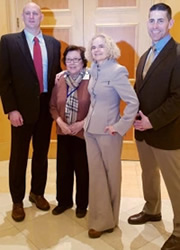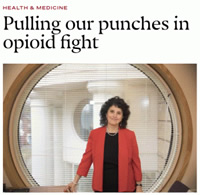News from the Nodes
Northeast Node
 The Fire Chief of New Hampshire's Manchester Fire Department, Daniel Goonan, attended the 2018 CTN Annual Steering and Scientific Meeting in North Bethesda, MD to present Safe Station to CTN researchers, partners, and affiliates. The Fire Chief of New Hampshire's Manchester Fire Department, Daniel Goonan, attended the 2018 CTN Annual Steering and Scientific Meeting in North Bethesda, MD to present Safe Station to CTN researchers, partners, and affiliates.
 Safe Station is a novel community approach to the opioid epidemic -- the first of its kind in the nation. Anyone can walk into any of the 10 fire stations in Manchester, NH, at any time of the day or night, and ask for help with a substance use concern. The fire station responds, with the help of the city’s emergency medical services provider (American Medical Response [AMR]), by checking the person’s vitals and assessing substances of use. They also arrange rides via Lyft (city-funded contract) to either the local regional access point (RAP), Granite Pathways (for treatment referral, case management, and other resources), or to the Farnum Center for after-hours access to a "stabilization unit." If the person cannot be medically cleared due to other health conditions or recent use of substances, AMR will transport the individual to a local emergency department for a more detailed medical evaluation. Safe Station is a novel community approach to the opioid epidemic -- the first of its kind in the nation. Anyone can walk into any of the 10 fire stations in Manchester, NH, at any time of the day or night, and ask for help with a substance use concern. The fire station responds, with the help of the city’s emergency medical services provider (American Medical Response [AMR]), by checking the person’s vitals and assessing substances of use. They also arrange rides via Lyft (city-funded contract) to either the local regional access point (RAP), Granite Pathways (for treatment referral, case management, and other resources), or to the Farnum Center for after-hours access to a "stabilization unit." If the person cannot be medically cleared due to other health conditions or recent use of substances, AMR will transport the individual to a local emergency department for a more detailed medical evaluation.
Since its inception in May 2016, Safe Station has aided over 3,300 people from 160 different communities in New Hampshire, and over 15 other states, as far away as Alaska.
Most of those who utilize Safe Station cite a lack of ability to get into treatment programs when calling on their own, or they receive a "we can take you in 'x' number of days, weeks, or even months" answer. Safe Station attempts to capture that moment when the person either wants to seek help and provides immediate linkage to the RAP. "These are the poorest of the poor, the kind of people who don’t have insurance and don’t know who to call or where to go when they are ready. The Fire Department is a part of the community, a place people are comfortable coming for help because that’s what we do. We help people," Chief Goonan explained.
In the last year, Safe Station has responded to an 11% increase in overdoses but has seen a 24% decrease in fatalities. Though Chief Goonan advised that it’s impossible to tell whether the decrease in fatal overdoses is attributed to Safe Station, the city of Manchester has seen an influx of more potent and varied substances (i.e., carfentanil, U-47700, fentanyl) during the same time when the decrease in fatal overdoses has been observed. Safe Station programs have launched in many communities across the country, including Nashua NH, Rochester NH, Del Ray Beach FL, Lake County FL, Malden MA, Lynn MA, Brockton MA, Fire Department of New York NY, Los Angeles County Fire CA, Providence RI, Santa Fe NM, and Burlington VT (to name a few).
The Northeast Node is currently assisting in the evaluation of the Safe Station Model in Manchester, NH. Read more about the NIDA-funded study here. |
New England Consortium
 Researchers from the New England Consortium Node continue to inform key stakeholders across state and local governments about findings from CTN studies in addressing the opioid epidemic. Researchers from the New England Consortium Node continue to inform key stakeholders across state and local governments about findings from CTN studies in addressing the opioid epidemic.
 On Friday March 2, 2018, Shelly F. Greenfield, M.D., M.P.H. was a key organizer of a one-day conference, "Responses to the Opioid Epidemic: Innovating Policy to Enhance Treatment and Community Response" at PwC in Boston, MA. On Friday March 2, 2018, Shelly F. Greenfield, M.D., M.P.H. was a key organizer of a one-day conference, "Responses to the Opioid Epidemic: Innovating Policy to Enhance Treatment and Community Response" at PwC in Boston, MA.
The conference, organized by McLean Hospital and PwC, brought together key stakeholders, including the Governor of the Commonwealth of Massachusetts, the CEO of Partners HealthCare, and the Secretary of Health and Human Services in Massachusetts, with key experts in treatment, policy, and public health to build bridges between government, healthcare, academia, and the private sector to tackle the opioid crisis.
Hilary Connery, M.D., Ph.D., Sarah Wakeman, M.D., and Roger Weiss, M.D., participated in a panel discussion on key issues in opioid use disorder treatment.
A re-cap of the conference in the Harvard Gazette, “Pulling our punches in opioid fight” (Alvin Powell), features a Q&A with Shelly F. Greenfield, M.D., M.P.H. and was published on March 19, 2018.
Western States
 The Western States Node in collaboration with the ATTC Network Coordinating Office, The Great Lakes ATTC, the Pacific Southwest ATTC, and the Northwest ATTC, is pleased to co-host a national webinar titled “Treatment and Prevention of Opioid Use Disorder: Overview.” The Western States Node in collaboration with the ATTC Network Coordinating Office, The Great Lakes ATTC, the Pacific Southwest ATTC, and the Northwest ATTC, is pleased to co-host a national webinar titled “Treatment and Prevention of Opioid Use Disorder: Overview.”
Dennis McCarty, co-PI for the Western States Node, will lead the webinar on April 3, 2018 (registration for this event is full).
The webinar summarizes a paper in the 2018 Annual Review of Public Health that reviews the history of treatment for opioid use disorders in the United States, identifies opioid use disorder as a chronic problem with an elevated probability of a return to use, summarizes treatment recommendations, discusses prevention of opioid overdoses, and outlines treatment options available in Canada and some European countries.
The papers from the 2018 Annual Review of Public Health are now available on line in advance of print: https://www.annualreviews.org/journal/publhealth |